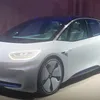[YS Exclusive] Robotaxis, fuel cells, and battery tech will be mainstream by 2030, says Continental CEO Elmar Degenhart
German automotive manufacturer Continental AG is preparing for a very different future. In an exclusive interaction with YourStory, CEO Elmar Degenhart speaks about the trends in the industry, and how robotaxis, fuel cells, and battery tech will replace the combustion engine.
With technology, environmental and safety concerns, user demands, and government regulations evolving at breakneck speed, the automobile industry is hurtling towards an interesting future. And as the Chief of a German automotive manufacturing major like Continental AG, Elmar Degenhart, the CEO of the company, is uniquely positioned to gaze into and prepare for many possible futures. For one, Continental has the courage to tell the world that gasoline engines will have no future beyond 2040.
The CEO of the €44-billion company also believes the world is for consumers to own the data, and they get to decide on how to monetise it. And at the centre of the data argument is software, which, according to Degenhart, will play a huge role in the automobile industry.
In this exclusive interview with YourStory, Elmar Degenhart, CEO, Continental AG, reveals the key trends in the automobile industry, and delves into how the internal combustion engine is seeing a slow death, slowly replaced by greener alternatives like electric and fuel-cell technologies.

Elmar Degenhart, CEO, Continental AG, is spearheading some exciting projects for the automotive industry, including robotaxis and harnessing the use of software for data and connectivity.
Edited excerpts:
YourStory: What are the key trends that will define the future?
Elmar Degenhart: I will give you an overview of the technology and how it is changing the future. The driving forces or mega trends are autonomous driving, connectivity and the cloud, and alternative drive systems. These digital technologies have to be accepted by the consumer if regulation makes them do so. Otherwise, an automobile company can no longer force these technologies onto people. But we cannot ignore the trends I mentioned. We have to differentiate between autonomous, assisted, and partially autonomous driving, and how these technologies make it to the market. Safety is a priority for assisted and partial driving. Autonomous driving, as the name suggests, is Level5 autonomy, which means the car can take you from Point A to B completely on its own.
Then there are other themes like the cloud. Consumers will pay for connected and cloud functions. This could mean blockchain features for information sharing between different vehicles. Before we talk blockchain, which I will come back to, we have to first implement connectivity in cars in a safe manner, because it is not safe to use mobile phones. So, we need to find ways for people to use connectivity while driving. The other big thing we have to look at is going in to the direction of carbon-free vehicles. We are replacing combustion with electric technologies and fuel-cell technologies. We are enhancing functionality step by step for disruption.
YS: What will support these trends?
ED: It will be software, in the form of super computers, along with new-generation electronic and electric architectures. First, we need to break the complexity of having data organised, and this data is generated by multiple electronic control units (ECU). At least 100 ECUs are in a vehicle. The automobile industry created an information network and this started 10 years ago, which got so complex that it is a real headache to gain control over this network. So, it is our role at Continental to simplify this. For this, we will use standardised server architectures, and use super computers of chip-on-chip technology to integrate software from different suppliers. Then the car will be run on one super computer. Today, legacy is the problem, and super computers will solve the problem of data and connectivity.
YS: So is it a race then for software excellence?
ED: The race is on for software competence. The software-as-a-service industry is $30 billion today, and will be $1,500 billion by 2030. Software will be going from $280 billion to $1,200 billion. This brings the importance of software to the attention of everyone in the entire industry.
Continental AG has 44,000 engineers worldwide, and for working with software, we have 19,000 engineers who have an IT background.
Software is critical, and it is critical to our success for the next 10-15 years. The time to build competence is running out for the automotive industry, and they need software to build competence. Who will be the winner? The automotive or the IT industry? There will be winners and losers on both sides.
YS: What are your thoughts on autonomous driving and electric vehicles becoming mainstream?
ED: Autonomous driving for me is about how people, say five or six at once, can be mass transported to their destination in a faster way. For this, we need higher camera technologies, and electronic stability control systems that are connected to the cloud. These technologies are making a contribution towards seamless mobility. It takes time to bring autonomous vehicles to individual car owners. That said, robo taxis and mass transport will be in before 2030, and I see this as a reality. For individual drivers, assisted driving will continue till 2030, and I believe that will be 90 percent of the consumer market. On the other hand, autonomous vehicles for individual car owners is still far away, because we have to test them for safety.

Continental is testing its sensors on a robotaxi, which is aimed at picking you people from a metro station and dropping them home.
On electric vehicles, our new generation electric vehicle technology will hit the market in China first. We have a highly integrated power train with the gear box and inverter. This will be great for urban commute and for a distance of 250 kilometres. This directly impacts the gasoline industry.
We predict that combustion technology will be phased out by 2040. The last generation of combustion engines will go into production between 2025 and 2030.
The future will be purely electric, but not purely battery electric. Battery electric is good for small vehicles, say for a 250 km drive. Fuel-cell technology will be the technology that Continental will look into for heavier vehicles. The reason we are doing this is because we want to have a zero-emission situation in the future. China, Japan, Korea, and Germany are investing in fuel-cell technologies. Continental is looking into these technologies because of the environment and also the fact that it can be as affordable as battery technology. We believe regulation in continents like Asia and Europe will drive manufacturers to invest in fuel cells and electric vehicles.
I believe we have to develop technologies in a smart and intelligent way. If you are too fast you will burn a lot of money. And if you are not fast enough, you lose market share. We are not shy of the future and see it as an opportunity. In future, we need to make it inclusive for people who worked in the automobile industry and they need to be given opportunities to enhance their education and come back to the industry.
YS: What are your thoughts on artificial intelligence and blockchain?
ED: Thanks to new technologies there are intelligent intersections in traffic and road conditions. The man-machine interaction will get better in cities. For example, smart street lights can assist drivers.
We are using blockchain with regard to data and we are managing data, which has a direct link to vehicles and driving. For example HPE, Crossroads, and Continental have built an Ethereum-based rewards and verifying mechanism.
We use AI in the finance and HR functions at Continental today. Since it's a lot of data, the management of data is key to allow access to software-as-a-service. Data should be owned by the owner of the vehicles: it can be annonymised, monetised, and controlled by the owner. Our view is that it has to be a world where people should know what their data is being used for.
We have a commission in Germany that discusses ethical AI. It's absolutely important that we have to give software engineers guidelines and codes. We cannot leave it up to them to decide certain use cases. There are complex situations where safety is concerned.
Take the case of an accident. How can AI save or prevent casualties? How can AI reduce the speed of the vehicle until crash is unavoidable? These are questions that we are asking, and the answer is we need guidelines and codes that we follow before we implement and make AI mainstream.
(Edited by Evelyn Ratnakumar)


![[YS Exclusive] Robotaxis, fuel cells, and battery tech will be mainstream by 2030, says Continental CEO Elmar Degenhart](https://images.yourstory.com/cs/2/eab8e580-2d6a-11e9-aa97-9329348d4c3e/Imageofbv1562227857919.jpg?mode=crop&crop=faces&ar=2%3A1&format=auto&w=1920&q=75)

1557748024448.png?fm=png&auto=format&h=100&w=100&crop=entropy&fit=crop)






